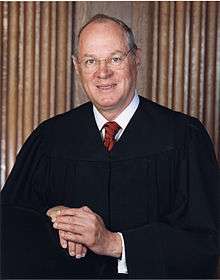The Volokh Conspiracy
Mostly law professors | Sometimes contrarian | Often libertarian | Always independent
Justice Kennedy Questions Chevron Deference
In a concurring opinion issued today, the Supreme Court's key swing vote justice expressed serious misgivings about a major Supreme Court precedent requiring courts to defer to executive branch administrative agencies.

In a important concurring opinion issued today, Supreme Court Justice Anthony Kennedy expressed serious misgivings about Chevron v. Natural Resources Defense Council, a major Supreme Court precedent requiring federal judges to defer to executive branch agencies' "reasonable" interpretations of federal law in cases where the law is "ambiguous." Kennedy's opinion was a solo concurrence in Pereira v. Sessions:
This separate writing is to note my concern with the way in which the Court's opinion in Chevron U. S. A. Inc. v. Natural Resources Defense Council, Inc., 467 U. S. 837 (1984), has come to be understood and applied….
In according Chevron deference to the [Board of Immigration Appeals'] interpretation [of the statute at issue in this case], some Courts of Appeals engaged in cursory analysis of the questions whether, applying the ordinary tools of statutory construction, Congress' intent could be discerned, 467 U. S., at 843, n. 9, and whether the BIA's interpretation was reasonable, id., at 845. In Urbina v. Holder, for example, the court stated, without any further elaboration, that "we agree with the BIA that the relevantstatutory provision is ambiguous." 745 F. 3d, at 740. It then deemed reasonable the BIA's interpretation of the statute, "for the reasons the BIA gave in that case." Ibid. This analysis suggests an abdication of the Judiciary's proper role in interpreting federal statutes.
The type of reflexive deference exhibited in some of these cases is troubling. And when deference is applied to other questions of statutory interpretation, such as anagency's interpretation of the statutory provisions that concern the scope of its own authority, it is more troubling still….
Given the concerns raised by some Members of this Court, see, e.g., id., at 312–328; Michigan v. EPA, 576 U. S. ___, ___ (2015) (THOMAS, J., concurring); Gutierrez-Brizuela v. Lynch, 834 F. 3d 1142, 1149–1158 (CA10 2016) (Gorsuch, J., concurring), it seems necessary and appropriate to reconsider, in an appropriate case, the premises that underlie Chevron and how courts have implemented that decision. The proper rules for interpreting statutes and determiningagency jurisdiction and substantive agency powers should accord with constitutional separation-of-powers principles and the function and province of the Judiciary.
Kennedy is the Supreme Court's key swing voter on many issues, and his criticism of Chevron deference in today's opinion increase the likelihood that Chevron deference will be overruled or at least narrowed in future Supreme Court decisions. It is also notable that in referring to "the concerns raised by some Members of this Court," Kennedy cites well-known opinions by Justices Clarence Thomas and Neil Gorsuch suggesting that Chevron should be overruled entirely, because it is an abdication of judicial responsibility. For reasons I summarized here, I believe that Gorsuch and Thomas are right about this. The courts should not farm out issues of legal interpretation to executive branch agencies - especially not in an era of extreme polarization when those interpretations are often heavily influenced by partisan and ideological bias. Kennedy is right to imply that agency bias may be especially likely in cases where the agency interprets the scope of its own authority.
Kennedy's opinion does not not necessarily mean he is willing to go as far as Gorsuch and Thomas. It is possible he prefers to narrow the scope of Chevron deference rather than get rid of it completely. Even with Kennedy's support, it is not yet clear that there are five votes on the Supreme Court in favor of significantly paring back Chevron. Nonetheless, the opinion is a signal that Chevron may well be in more serious trouble than many commentators (myself included) previously believed.
It is also worth noting that conservatives like Gorsuch, Thomas, and now Kennedy are not the only ones who have begun to seriously question Chevron. In a recent Harvard Law Review article for which they surveyed forty-two federal appellate judges, Judge Richard Posner and Abbe Gluck found widespread skepticism about Chevron among both liberals and conservatives. In his solo dissent in Pereira, Justice Samuel Alito calls Chevron "an important, frequently invoked, once celebrated, and now increasingly maligned precedent." He isn't wrong to suggest that the ranks of the "maligners" are growing.
UPDATE: I should note that Kennedy's views may not matter much if he retires from the Court this year, as many have speculated he might. My own reading of the tea leaves is that he probably will not retire. But I could easily be wrong about that, and my track record on predicting what Kennedy may or may not do is very far from perfect.


Show Comments (22)